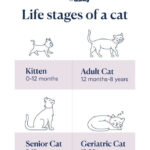Dehydration in cats is a serious condition that occurs when their body loses too much fluid. This fluid loss isn’t just water; it also includes essential electrolytes like sodium, chloride, and potassium, which are vital for numerous bodily functions. Water plays a crucial role in your cat’s overall health, aiding in everything from circulation and digestion to waste removal. Ensuring your cat stays properly hydrated is essential because untreated dehydration can lead to severe health complications.
What are the Common Causes of Dehydration in Cats?
Cat dehydration arises primarily from two scenarios: insufficient water intake or excessive fluid loss. While cats do lose minimal moisture through their paw pads, this is negligible compared to other causes. Several factors can contribute to dehydration in cats, including underlying health issues and environmental conditions. These include:
- Diabetes: This condition can lead to increased urination, causing significant fluid loss.
- Diarrhea or Loose Stool: Both diarrhea and loose stool expel a large amount of water from the body, quickly leading to dehydration.
- Fever: Elevated body temperature increases the rate of fluid loss.
- Heatstroke: Overheating, especially in hot weather, can cause rapid dehydration.
- Hot Weather or Overheating: Even without heatstroke, high temperatures can lead to increased water loss through panting and evaporation.
- Trauma: Injuries can sometimes lead to fluid loss, particularly if there is bleeding or internal damage.
- Vomiting: Similar to diarrhea, vomiting expels fluids and can quickly dehydrate a cat.
- Kidney Disease: Cats with kidney disease often urinate more frequently, increasing their risk of dehydration.
- Hyperthyroidism: An overactive thyroid can also lead to increased urination and subsequent dehydration.
Providing your cat with constant access to fresh, clean water in a readily accessible bowl is crucial for maintaining healthy hydration levels and preventing dehydration.
How Much Water Should a Cat Drink Daily?
A general guideline for daily water intake in cats is approximately 3.5 to 4.5 ounces of water for every 5 pounds of body weight. For example, a 10-pound cat should ideally consume between 7 and 9 ounces of water each day. However, individual needs can vary based on diet and activity levels.
If your cat primarily eats wet food, you might observe them drinking less water directly from their bowl. This is because wet cat food has a high moisture content, often around 70% to 80% water. Therefore, they are already getting a significant portion of their daily fluid intake from their meals.
Conversely, cats that primarily eat dry kibble need to obtain most of their hydration from drinking water. Dry food has a much lower moisture content, making it essential for these cats to drink adequately from their water source to stay hydrated.
Recognizing the Signs and Symptoms of Dehydration in Cats
Ensuring your cat drinks enough water is a vital part of their daily care. If a cat isn’t adequately hydrated, they can quickly become dehydrated. Recognizing the symptoms of dehydration is crucial for prompt intervention.
Common signs of dehydration in cats include:
- Lethargy or Loss of Energy: Dehydrated cats often become tired and less active than usual.
- Panting: While more common in dogs, cats may pant when dehydrated, attempting to cool down and regulate body temperature.
- Refusal to Eat: Dehydration can lead to a decrease in appetite and a reluctance to eat.
- Sunken Eyes: The eyes may appear to sink slightly into their sockets in dehydrated cats.
- Dry or Tacky Gums: This is a key indicator. Gently lift your cat’s lip and touch their gums. If they feel sticky or dry instead of moist, dehydration is likely.
- Skin Tenting: Gently pinch and lift the skin on the back of your cat’s neck or between their shoulder blades. If the skin slowly returns to its normal position instead of snapping back quickly, your cat may be dehydrated.
If you observe any of these symptoms, especially dry gums and skin tenting, it’s essential to offer your cat water immediately and consult with your veterinarian as soon as possible. Dehydration can become a serious medical issue requiring veterinary intervention to rehydrate your cat safely and address any underlying causes.

